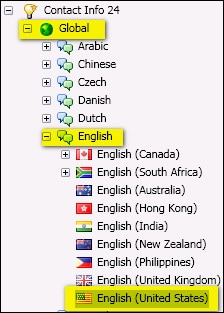Inheritance in a QKB
In a QKB, a locale’s ancestors are a language and the Global set of definitions and data types. For example, the English (United States) locale has ancestors English and Global, as shown in the next display.

Inheritance in a QKB
The locale English (United States) inherits definitions and data types that are associated with the English language, as well as all Global definitions and data types. In other words, all English and Global definitions and data types are available in the English, United States locale. The reason for this architecture is that it is sometimes desirable to share a definition or data type across locales that have the same language, or even across locales that have different languages. The inheritance model allows this sharing.
Note that when you view the list of available definitions in a node in a data job, you see all of the definitions that are associated with the QKB locale that you have selected, plus the definitions associated with the locale’s language, plus all Global definitions. This inheritance happens transparently. You cannot see the ancestor information for a definition in a data job. You can see this implementation detail only when you open and browse the QKB.
A locale may contain a definition or data type that has the same name as a definition or data type that is associated with an ancestor of the locale. In this case the definition or data type associated with the locale overrides the definition or data type that is associated with the ancestor. For example, in the next display, an English (United States) definition has been added for Account Number. The local definition overrides the Global definition of the same name. The Global definition is automatically overridden and appears in a dimmed font.

Global Definition for Account Number Is Overridden
Sometimes a locale can have another locale as an ancestor. For example, locale French (Canada) has locale English (Canada) as an ancestor, as shown in the next display.

Two Locales Available for Canada
The locale French (Canada) inherits all objects from locale English (Canada). This allows an easy way to share definitions and data types between locales that have the same country.